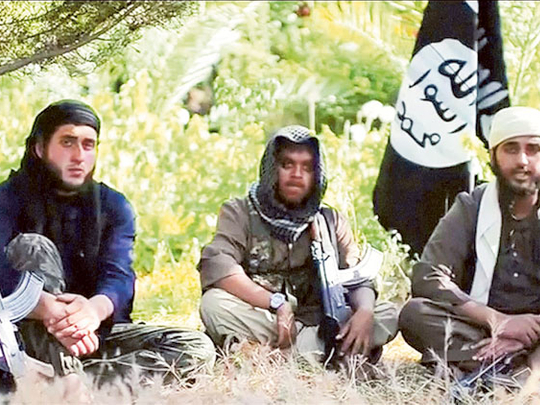
Dubai: The discussion of how best the international community can deal with those radicalised and currently fighting in Syria and Iraq for groups such as Isil is one that has been running for years. Even before the once peaceful civil uprising turned into a violent civil war in Syria, extremism in Iraq, Pakistan, Saudi Arabia and Indonesia to name but a few has been met with the same question in the West: How can we best protect ourselves from the extremists?
The recent execution of James Foley in Syria evokes emotive, if not always rational responses, in a similar way to the September 11 attacks. “Send them to the gallows” and “take away their passports” are but some of the cries heard. But the real debate, whether or not the patience exists to take a more nuanced approach to the hardliners is possible, is far more complicated.
Whilst the United Kingdom is symptomatic of the issues facing many countries around the world today, there is a high number of Britons fighting in Isil-controlled territories — as many as 500. Furthermore, given the likelihood that a British national murdered James Foley, there is evidence that British and indeed foreign fighters in general are now playing a role in even the bloodiest of humanitarian atrocities being carried out by the extremist group.
A wave of outrage
London mayor Boris Johnson recently called for all British fighters in Syria to be presumed guilty, whilst several members of the British Parliament have advocated defying international law to call for British citizens to have their citizenship revoked, even if it renders them stateless. Both calls come as part of a wave of outrage at the militants who are judged to have betrayed British values. But such an approach has plenty of critics, Shiraz Maher and Peter Neumann of the London-based International Centre for the Study of Radicalisation and Political Violence (ICSR) suggested recently that such an approach would “increase — rather than diminish — the terrorist threat [to the UK]”.
In an article for The Independent, Maher and Neumann suggest that the hard-line approach to such individuals risks becoming a “self-fulfilling prophecy’. It risks pushing militants further into lure of religious militancy and might destroy any motivation and/or opportunity to abandon the cause. One study, of nearly a thousand returning militants, found that only one in nine go on to commit terrorist activity again. This would appear to leave a majority with whom engagement and deradicalisation may be possible.
The Saudi project
One of the main ways to achieve this would be through deradicalisation projects. There are currently thousands of militants around the world undergoing such processes, the Saudi Arabia approach being the most lauded in recent years. The Saudi project began in 2004 as a response to domestic terrorist attacks in the kingdom. The scheme combined elements such as rehabilitative counselling, vocational education and alternative religious narratives. Indeed, militancy inside Saudi Arabia has dropped significantly since the implementation. There hasn’t been a successful attack on Saudi soil since, and the Saudi Ministry of interior claims recidivism rates of less than 20 per cent, though some claim it is too soon to know how effective the programmes have really been.
It is important to note that there is no panacea to radicalisation. These programmes are not 100 per cent successful, but preliminary results suggest that they can be effective in dealing with the violent extremists.
The Saudi approach has also been proactive in preventing radicalised subjects from travelling to Syria in the first place; only last week, the kingdom’s interior ministry announced the arrest of eight individuals for attempting to recruit youths to fight abroad for Isil. Yet this is something that Western nations, particularly the UK has been slow in adopting. A reactive, punitive approach in Britain, wherein subjects who are believed to have fought in Syria are arrested on return to the UK has had little effect on the jihadist recruitment drive.
But as Neumann pointed out, deradicalisation can only be effective if the conditions are right, the extremists have to feel that they are losing, highlighting that “where there is an ongoing civil war, such as in Afghanistan, it is much more difficult, even impossible”. This would appear to be the critical difference between a programme that has been generally been regarded as successful, such as in Saudi Arabia, and any potential scheme focusing on extremists in Syria. Ergo, a way must be found to begin pushing back Abu Bakr Al Baghdadi’s Isil “caliphate” before any deradicalisation programme can be effective.
There is, however, a very fine line to tread here. Whilst the US and European allies may indeed have the firepower to punch back Isil militarily, they must not risk any sort of mission creep that could be spun as a recruitment tool for the militant group. Any actions that appear invasive or imperialist risk turning into a much sought-after recruitment tool for the militants. As Quillium, a London-based counter extremism think tank pointed out, Syria’s prominence in Islamic history gives the extremist narrative far more traction than it has benefited from in other countries fraught with extremism. Analysts say that it is, therefore, critical that any intervention, be it humanitarian or military, does not feed the jihadist narrative.
— Gareth Browne is an intern at Gulf News












